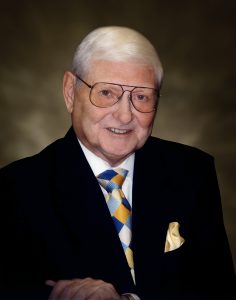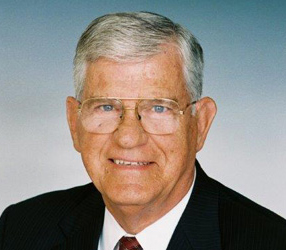We are now known as the James G. Martin Center for Academic Renewal. But, until late in 2016, the organization was called the John W. Pope Center for Higher Education Policy.
John William Pope: Our First Namesake

John William Pope was a philanthropist and businessman with a deep devotion to higher education. Mr. Pope graduated from UNC-Chapel Hill in 1947 with a bachelor’s degree in commerce. He later joined his father’s retail business. By the 1980s, Variety Wholesalers was the largest privately owned retail variety store chain in the Southeast. With the profits from his business, Pope created the John William Pope Foundation in 1986.
Governor James G. Martin appointed Pope to the Board of Trustees of UNC-Chapel Hill in 1989. Upon becoming a trustee of his alma mater, Pope took a close look at his university and did not like the ways it had changed over the years. As a trustee, he found too much politicization, a curriculum that had eroded, and falling academic standards. Therefore, he suggested that the John Locke Foundation (founded in 1989 with funding from the Pope Foundation) should begin to focus more on higher education issues in North Carolina.
The first result of that was the publication of a paper by author Charles J. Sykes, who had come to national fame with his 1988 book Profscam. It examined the declining teaching loads of the faculty in the UNC system.
In 1996, the Pope Center for Higher Education Reform began as a small operation within the John Locke Foundation. It consisted of one staffer, Jon Sanders, working on higher education issues. He compiled information on colleges and universities, wrote articles and letters, and produced a monthly newsletter, Clarion. It focused mainly on the foibles throughout the UNC system. One notable feature was Sanders’ “Course of the Month,” which always exposed a course that was of questionable academic value. (Here is an example from 2003.)
In 1999, the John Locke Foundation scaled up the Pope Center, renaming it the John W. Pope Center for Higher Education Policy. George Leef became the Center’s full-time director. Leef’s college teaching career spanning the decade of the 1980s had given him a rather dim view of what was happening to higher education in America.
That year, the Pope Center began publishing lengthy inquiry papers on higher education issues. One of the first, published in 2001, was on the much-debated topic of faculty compensation. The paper argued that there was no need for UNC to keep spending more to keep star professors from taking lucrative offers elsewhere. The following year, the big higher education issue in North Carolina was a $3.1 billion bond to pay for renovation and new construction. The Center released a paper arguing that the bond was too costly and that passing it would encourage officials to continue neglecting old structures in favor of building new ones.
The Pope Center: An Independent Organization
By 2003, it was clear that higher education needed more attention. The Pope Center became an independent 501(c)(3) organization.
Over the years, some of the other major papers the Center released were: an appraisal of the UNC system from the standpoint of the First Amendment (many schools were found wanting), a paper arguing that higher education has been oversold, a paper on the connection between the Supreme Court’s decision in Griggs v. Duke Power and the artificial demand for college credentials, and a study of the problem of getting college officials to respect donor intent.
In 1999, the Center also began holding annual conferences, each devoted to a particular set of higher education issues. Among the keynote speakers at these conferences were Alan Kors, Abigail Thernstrom, Richard Vedder, and Peter Wood.
Late in 2006, the Center’s board hired Jane Shaw, who had been the executive director of the Property and Environment Research Center, to be the organization’s president, with George Leef assuming the role of research director. The staff was expanded and the publication output increased to three articles per week. Also, more articles were commissioned from noted higher education experts such as Hillsdale College president Larry Arnn, UCLA law professor Richard Sander, and Brooklyn College history professor KC Johnson.
In 2015, Jane Shaw retired as president. Jenna Robinson, who had been the Center’s director of outreach, was chosen to take over as president. Jane Shaw remained on the Board and continues to contribute articles.
A New Era: The James G. Martin Center for Academic Renewal
In 2016, the Board decided there was too much confusion between the Pope Center and the Pope Foundation. It concluded that a name change was in order. The name chosen was the James G. Martin Center for Academic Renewal.

James G. Martin is the former governor of North Carolina who served from 1985 until 1993, following six terms as a member of the U.S. Congress. As governor, Martin was known for his interest in education. He holds a Ph.D. in chemistry from Princeton University and taught chemistry at Davidson College for twelve years. During his time at Davidson, Governor Martin was already shaping higher education policy. Martin helped design Davidson’s Blue Sky Curriculum, which encouraged independent study and broadened course offerings.
Martin was the first elected official to receive the American Chemical Society’s Charles Lathrop Parsons Award for outstanding public service by an American chemist. He was a corporate vice president of Carolinas HealthCare System. Later, he was a member of the North Carolina government relations practice of McGuire Woods Consulting. He also served for three terms as a Mecklenburg County commissioner. Martin headed an investigation into the athletics scandal at UNC-Chapel Hill in 2012.
The Martin Center became a public charity in 2019.
The Martin Center continues the work that John William Pope began. The Center’s mission and goals can be found here.
